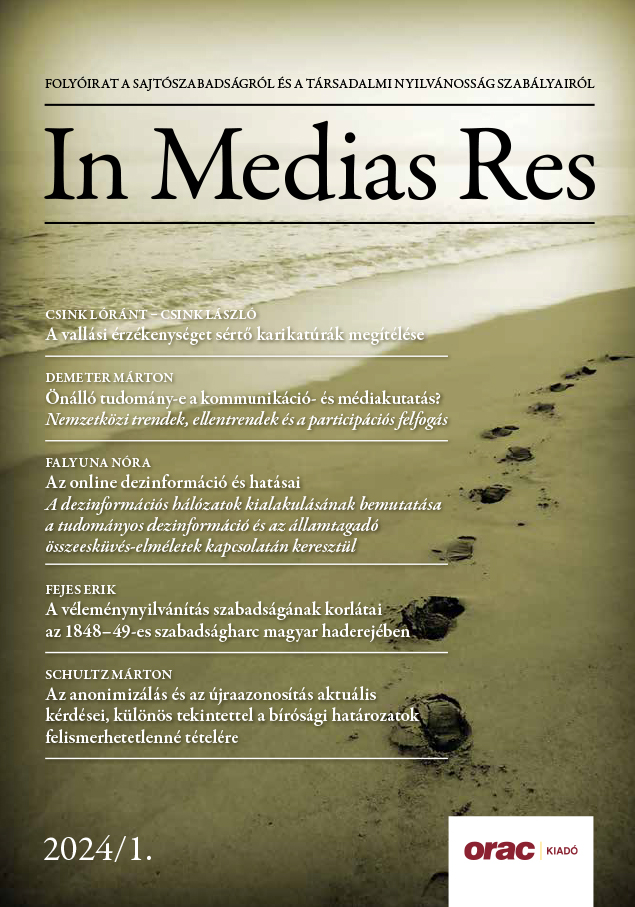Thoughts about information operations and freedom of information space
DOI:
https://doi.org/10.59851/imr.13.1.8Keywords:
information space, information society, information operations, national interest, geopoliticsAbstract
The aim of the study is to highlight that the development of information technologies and the information environment necessarily goes hand in hand with the intensified use of information to influence. The latter can be linked to the concept of information operations, which in the context of complex security can be defined in a broader sense than the military. Information operations in the broad sense may serve military, intelligence, political-diplomatic, economic or even various illegitimate purposes. These require effective protection, which implies both credible and active counteraction and the application of restrictions. However, in the modern constitutional states of the transatlantic area, freedom of expression is a fundamental right which, although it can be restricted, is of the utmost importance in the information space. The vast majority of contemporary states see the information space as a key dimension of freedom of expression, the development of individual and social relations and the development of the personality. Its freedom is therefore a fundamental value, which at first sight is limited by the implementation of information operations and the protection against them. The aim of this paper is to point out, in principle, that the relationship between information operations and freedom of information space cannot, however, be described as a zero-sum game.
References
Aiken, Mary: Cybercsapda (ford. Török Csaba). Budapest, Harmat, 2022.
Alotaibi, Faisal et al.: A Review of Using Gaming Technology for Cyber-Security Awareness. (2) International Journal for Information Security Research (2016660666).
Bhaskar, Ranjit: Better Cybersecurity Awareness Through Research. (3) ISACA Journal (2022) 1–10.
Castells, Manuel: A hálózati társadalom kialakulása (ford. Rohonyi András). Budapest, Gondolat, 2005.
Csutak Zsolt: Új idők új hadviselése – kognitív biztonság az információs és a kiberhadviselés korában. Honvédségi Szemle, 2018/5., 33–45.
Farkas Ádám: A védelem és biztonságszavatolás szabályozásának alapkérdései Magyarországon. Budapest, Magyar Katonai Jogi és Hadijogi Társaság, 2022.
Farkas Ádám – Spitzer Jenő: Az információs korszak és az állami reziliencia egyes kérdései. Védelmi-biztonsági Szabályozási és Kormányzástani Műhelytanulmányok, 2021/18., 1–27.
Garcia-Camargo, Isabella – Bradshaw, Samantha: Disinformation 2.0: Trends for 2021 and Beyond. Hybrid CoE Working Paper 11, 2021.
Giannopoulos, Georgios – Smith, Hanna – Theocharidou, Marianthi (szerk.): The Landscpae of Hybrid Threats: A Conceptual Model. Luxembourg, EU – Hybrid CoE, 2021.
Gosztonyi Gergely: Cenzúra Arisztotelésztől a Facebookig. A közösségi média tartalomszabályozási gyakorlatának komplexitása. Budapest, Gondolat, 2022., https://doi.org/10.24362/cenzura.gosztonyi.2022
Haig Zsolt: Információs műveletek a kibertérben. Budapest, Dialóg Campus, 2018.
Ireton, Cherilyn – Posetti, Julie (szerk.): Journalism, Fake News and Disinformation. Paris, UNESCO, 2018.
Kelemen Roland: A nem állami kibertéri műveletek egyes szereplőinek jelentősége a hibrid konfliktusokban. SmartLaw Research Group Working Paper, 2021/2., 1–17.
Kelemen Roland: Radikalizálás, dezinformálás és tömegpszichózis modern köntösben: a hibrid konfliktus kibertérben. Jog – Állam – Politika, 2021/3., 71–85.
Kelemen Roland: Cyberfare state – egy hibrid állammodell 21. századi születése. Military and Intelligence CyberSecurity Research Paper, 2022/1., 1–36.
Kelemen Roland: A kibertér jellemzőinek biztonság központú vizsgálata. Jog – Állam – Politika, 2023/1., 75–90., https://doi.org/10.58528/JAP.2023.15-1.75
Kelemen Roland – Németh Richárd: Társadalmi hálózatok és reziliencia. Védelmi-biztonsági Szabályozási és Kormányzástani Műhelytanulmányok, 2022/13., 1–31.
Koltay András: A szólásszabadság alapvonalai. Budapest, Századvég, 2009.
Koltay András – Török Bernát (szerk.): Sajtószabadság és médiajog a 21. század elején. Budapest, Wolters Kluwer, 2015.
Kovács László: Kiberbiztonság és -stratégia. Budapest, Dialóg Campus, 2018.
Krasznay Csaba: Kiberbiztonság a XXI. században. Budapest, Katonai Nemzetbiztonsági Szolgálat, 2022.
Krekó Péter: Tömegparanoia. Budapest, Athenaeum, 2018.
Krekó Péter: Tömegparanoia 2.0. Budapest, Athenaeum, 2021.
Lebek, Benedikt et al.: Information Security Awareness and Behavior: A Theory-Based Literature Review. 12 Management Research Review (2014) 1049–1092., https://doi.org/10.1108/MRR-04-2013-0085
Majtényi László: Az információs szabadságok. Budapest, CompLex, 2006.
Mattelart, Armand: Az információs társadalom története (ford. Gelléri Gábor). Budapest, Gondolat, 2004.
McIntyre, Lee: Post-Truth. Cambridge, MIT, 2018., https://doi.org/10.7551/mitpress/11483.001.0001
Negroponte, Nicholas: Digitális létezés (ford. Csaba Ferenc). Budapest, Typotex, 2002.
Newman, Hadley: Foreign Information Manipulation and Interference Defence Standards: Test for Rapid Adoption of the Common Language and Framework ‘DISARM’. NATO, 2022. november 29., https://bit.ly/3QMHmMn.
Peters, Michael A. et al. (szerk.): Post-Truth, Fake News. Singapore, Springer Nature, 2018., https://doi.org/10.1007/978-981-10-8013-5
Pozderka Zoltán: Az információs műveletek helye és szerepe a művelettervezésben. Hadtudomány, 2016. különszám, 131–141.
Smuk Péter: Közérdek vs. közérdek: A vélemény- és információszabadság közérdekre alapozott igazolása és korlátozása. In Lapsánszky András – Smuk Péter – Szigeti Péter (szerk.): Köz/érdek. Elméleti és szakjogi megoldások egy klasszikus problémára. Budapest, Gondolat, 2017, 328–348.
Török Bernát: Az információszabadság. In Bódi Stefánia – Schweitzer Gábor (szerk.): Alapjogok – az emberi jogok alkotmányos védelme Magyarországon. Budapest, Ludovika, 2021.
Török Bernát – Ződi Zsolt (szerk.): Az internetes platformok kora. Budapest, Ludovika, 2022.
Wallace, Patricia: Az internet pszichológiája (ford. Krajcsi Attila). Budapest, Osiris, 2006.
White, Christopher – Thrall, A. Trevor – Mazanec, Brian M. (szerk.): Information Warfare in the Age of Cyber Conflict. New York, Routledge, 2021., https://doi.org/10.4324/9780429470509
Downloads
Published
How to Cite
Issue
Section
License
Copyright (c) 2024 Farkas Ádám

This work is licensed under a Creative Commons Attribution 4.0 International License.


